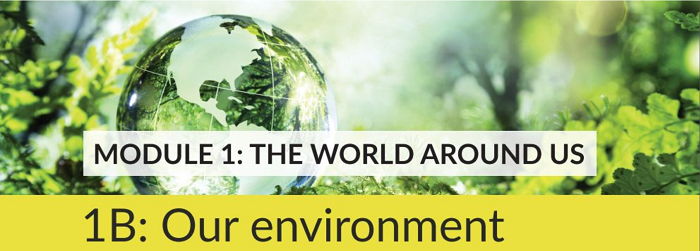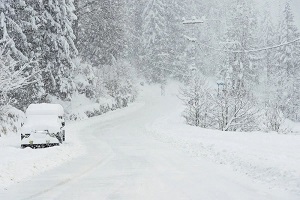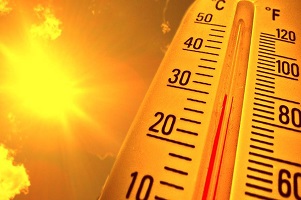Objectives: Develop vocabulary related to the environment.
Practise prepositions of place, time and movement

I. REVIEW VOCABULARY

A severe snow storm with strong winds

A long period when there is little or no rain

A large amount of water covering an area that is usually dry

A mass of cloud consisting of small drops of water near the surface of the earth

Warmth, esp. a lot of warmth

A raised movement of water rolling across the surface esp. of the sea

A violent storm with strong circular winds of at least 72 miles (or 118 kilometers) per hour, esp. in the western Atlantic Ocean

A flash of bright light in the sky produced by electricity moving within or between clouds, or between clouds and the ground
II. LANGUAGE DEVELOPMENT
Choose the correct options in italics to complete the text
Understanding noise pollution
Most of us are used to the sounds we hear in everyday life. Loud music, people talking on their phone and the traffic are part of our way of life. But we do not realise how much this can 1 move/affect .Pollution is not limited to nature and resources noise that upsets the natural rhythm of life also 2 supplies/delivers/produces a form of pollution. By definition, noise pollution 3 cause/ brings/ take place when there is a lot of noise which upsets us or is unhealthy. In our environment it has become difficult to escape noise. For example, many people have to live next to busy roads, which 4 increases/ spreads/grows the amount of unwanted sounds they have to live with. Noise pollution is serious and can lead to disturbed sleep, so we do need to 5 cope/deal/manage with the problem. However , it is hard to think of ways to 6 check/avoid/prevent it increasing even in the future.
Choose the correct prepositions to complete the sentences. There is 1 extra preposition for each sentence.
1. We have a recycling centre __________the main road,__________the supermarket,( at, on; next to).
2. There’s a rubbish bin__________the corner _________the desk ( abow, under, in).
3. The storm caused damage to a building ___________the station and the post office __________the end of the road ( at , below, between).
4. You can’t see the factory because it’s_________that wall, but you can see the smoke from it rising into the sky _________ the trees ( above, opposite, behind).
5. People living ________the airport don’t like the noise from the aeroplanes flying _______their house (near, below, above).
6. The river runs _________my house but there is a great deal of rubbish _________it (behind, in over).
Choose the correct options in italics to complete the sentences.
1. We have to go over / across the street to leave our rubbish.
2. They can’t go back / into home because the flood damaged their house.
3. Driving slowly through / over a city is bad for air pollution.
4. A lot of pollution comes from the road which goes right across / round the city.
5. The water can’t flow freely under / back the bridge because there is too much rubbish.
6. The article had a photo of birds walking down/over a street, unable to fly because of air pollution
7. This is the first stage across/ towards creating a cleaner city.
8. We need to get away / back from the city because it’s too polluted.

